40+ Sample Mentoring Agreement
-
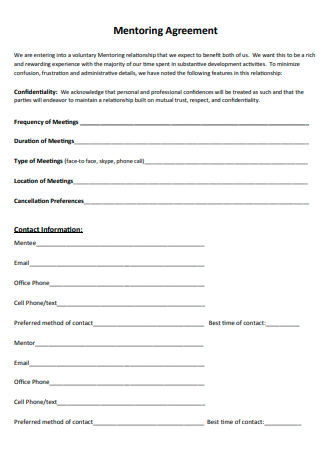
Mentoring Agreement Template
download now -
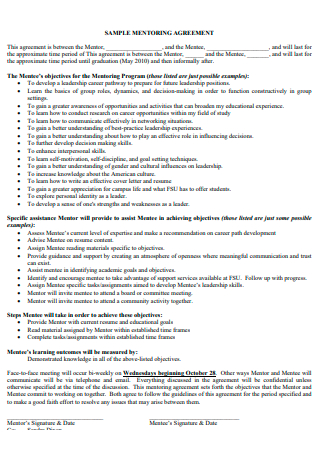
Sample Mentoring Agreement
download now -
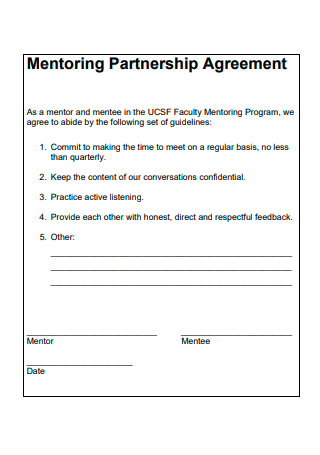
Mentoring Partnership Agreement
download now -
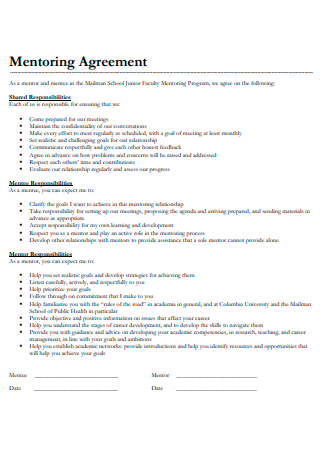
Mentoring Agreement Example
download now -
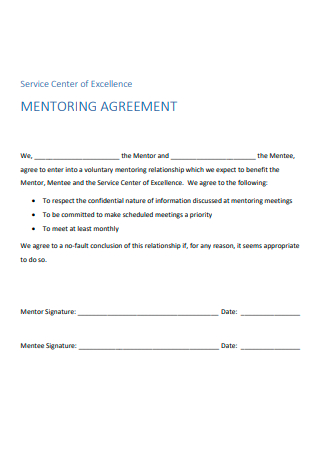
Service Center of Excellence Mentoring Agreement
download now -
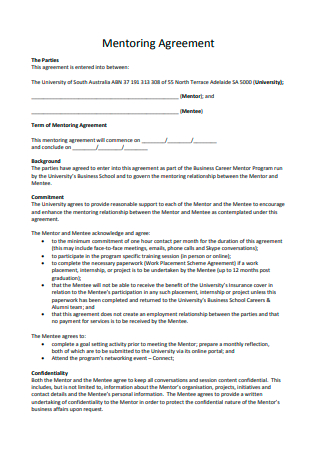
Standard Mentoring Agreement
download now -
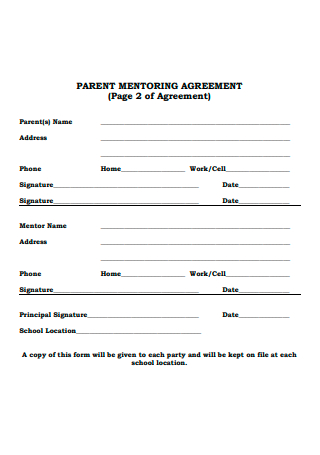
Parent Mentoring Agreement
download now -
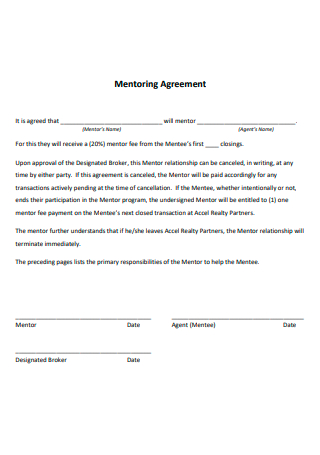
Basic Mentoring Agreement
download now -
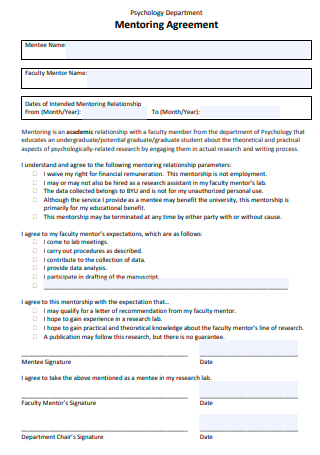
Psychology Department Mentoring Agreement
download now -
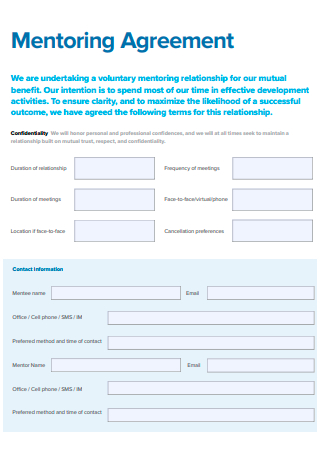
Formal Mentoring Agreement
download now -
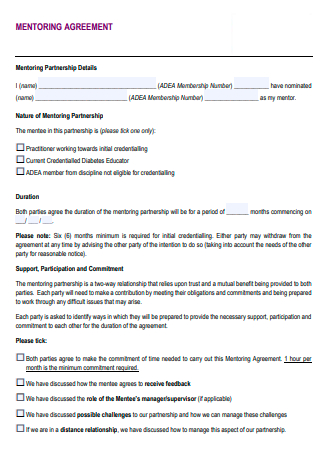
Simple Mentoring Agreement
download now -
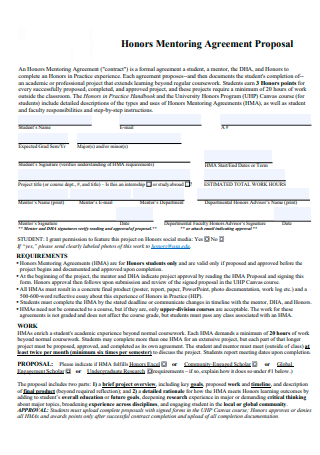
Honors Mentoring Agreement Proposal
download now -
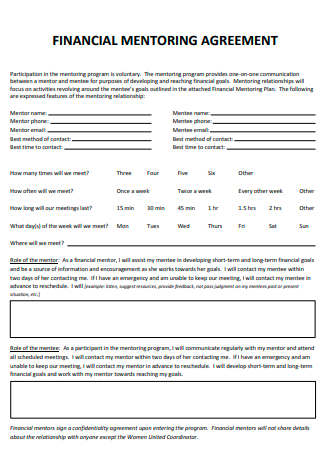
Financial Mentoring Agreement
download now -
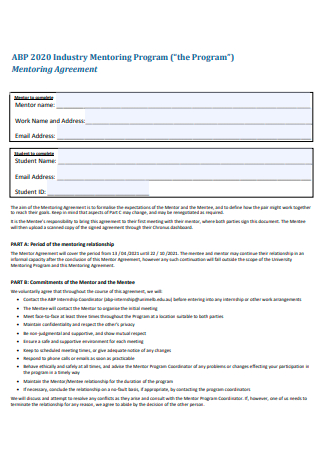
Industry Mentoring Program Agreement
download now -
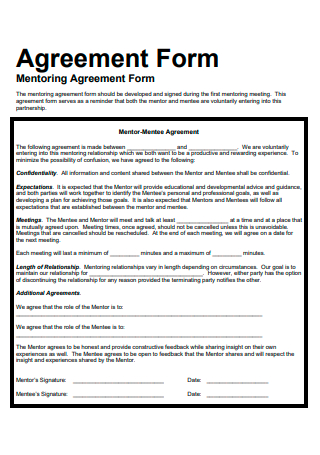
Mentoring Agreement Form
download now -
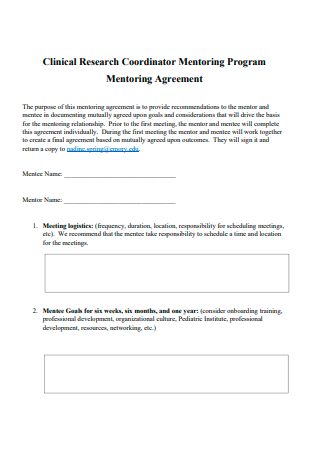
Clinical Research Coordinator Mentoring Program Agreement
download now -
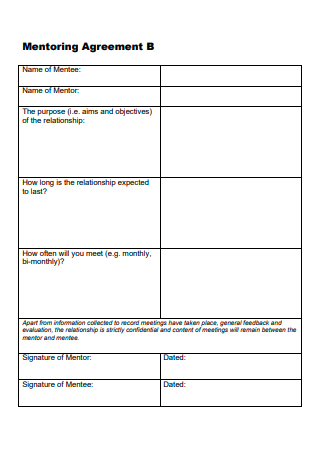
Mentoring Agreement Format
download now -
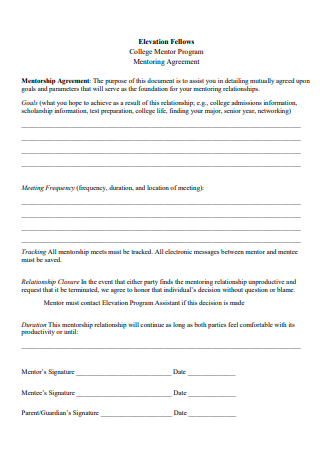
College Mentor Program Mentoring Agreement
download now -
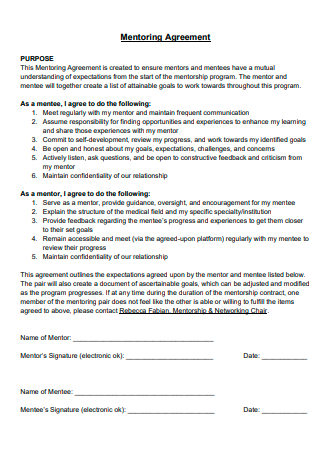
Printable Mentoring Agreement
download now -
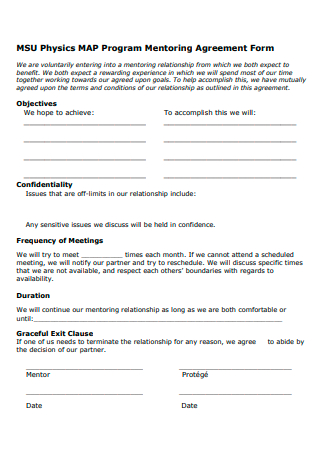
Program Mentoring Agreement Form
download now -
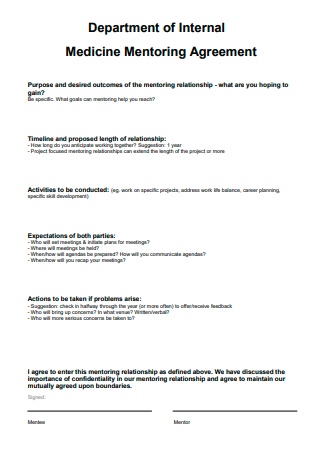
Department of Internal Medicine Mentoring Agreement
download now -
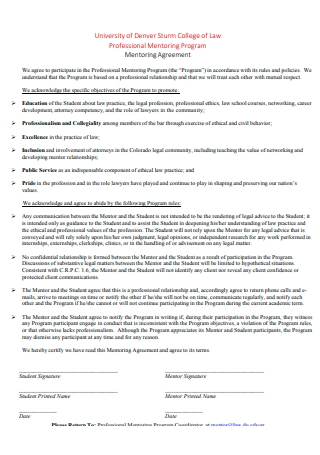
Professional Mentoring Program Agreement
download now -
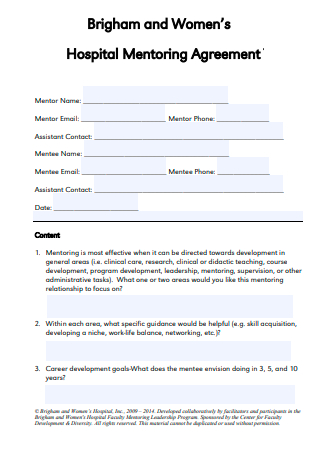
Hospital Mentoring Agreement
download now -
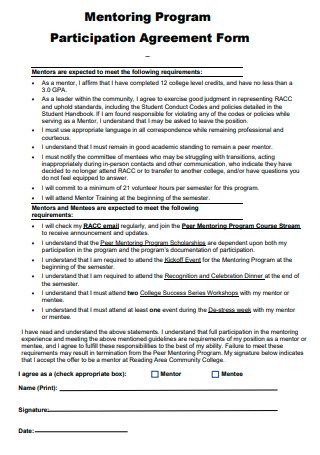
Mentoring Program Participation Agreement Form
download now -
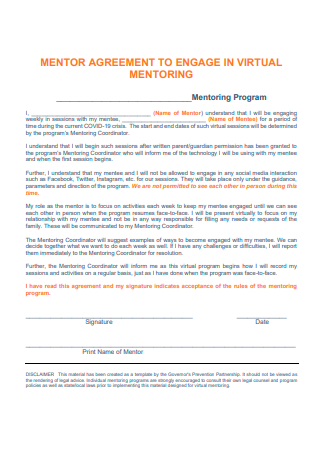
Virtual Mentoring Agreement
download now -
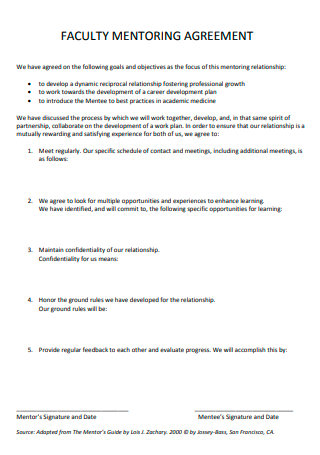
Faculty Mentoring Agreement
download now -
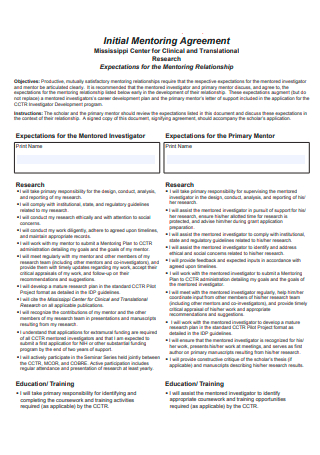
Initial Mentoring Agreement
download now -
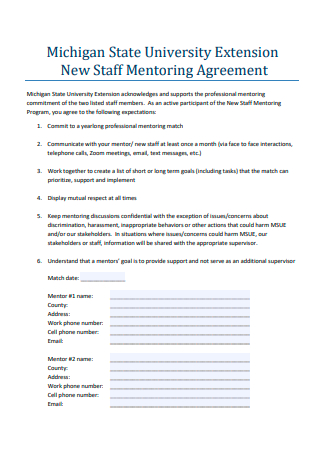
New Staff Mentoring Agreement
download now -
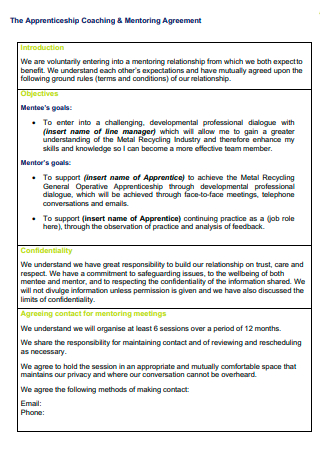
Apprenticeship Coaching and Mentoring Agreement
download now -
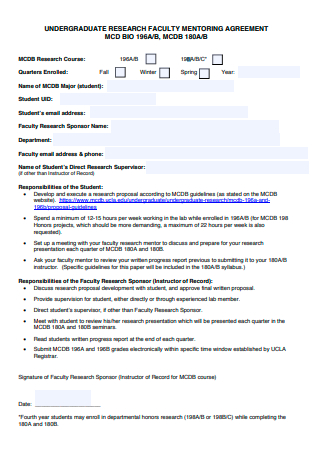
Undergraduate Research Faculty Mentoring Agreement
download now -
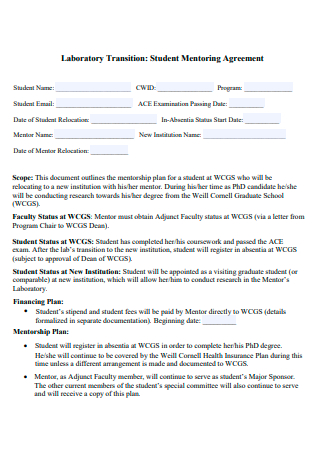
Student Mentoring Agreement
download now -
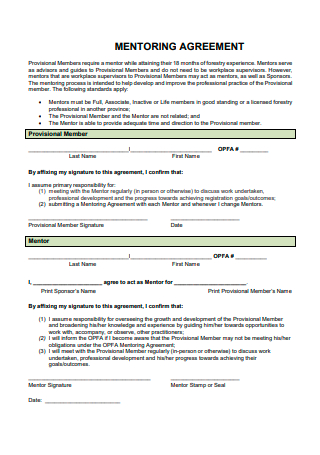
Draft Mentoring Agreement
download now -
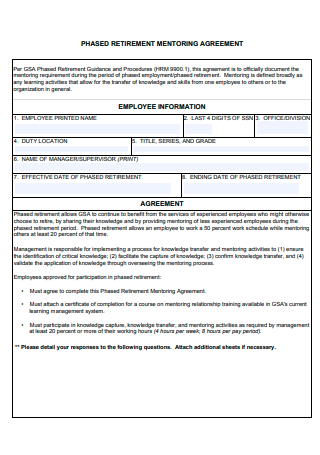
Retirement Mentoring Agreement
download now -
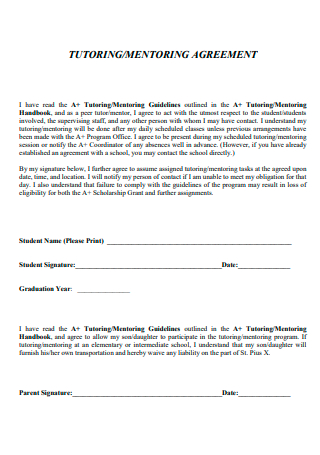
Tutoring Mentoring Agreement
download now -
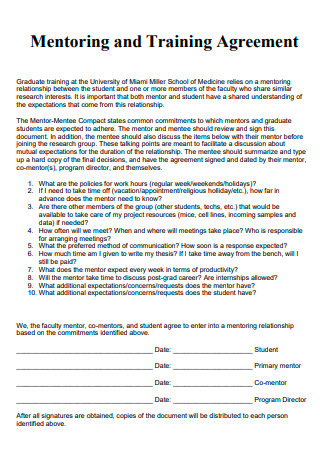
Mentoring and Training Agreement
download now -
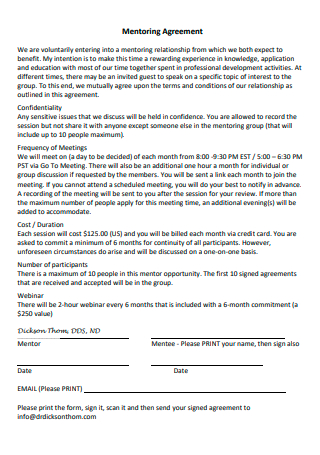
Mentoring Agreement in PDF
download now -
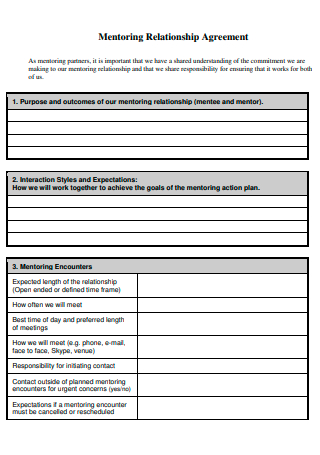
Mentoring Relationship Agreement
download now -
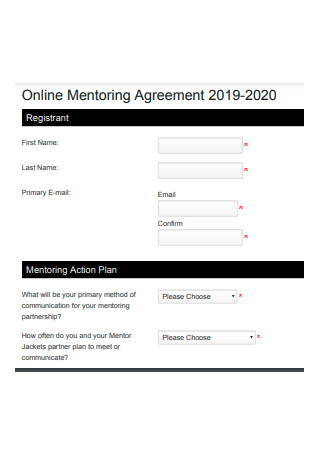
Online Mentoring Agreement
download now -
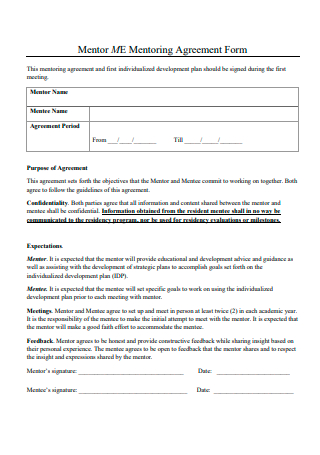
Mentor Mentoring Agreement Form
download now -
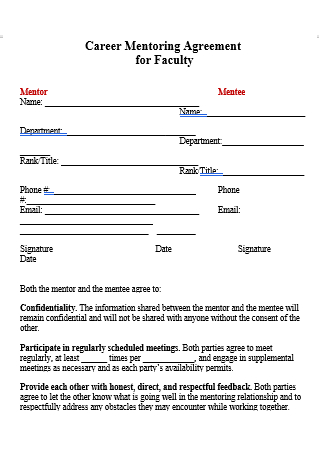
Career Mentoring Agreement For Faculty
download now -
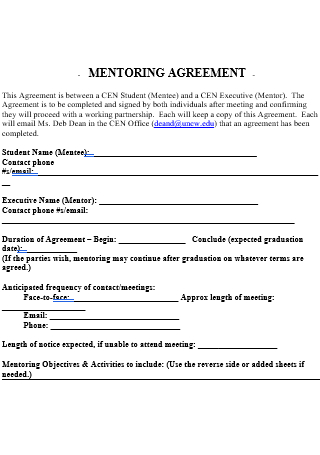
Mentoring Agreement in DOC
download now
FREE Mentoring Agreement s to Download
40+ Sample Mentoring Agreement
a Mentoring Agreement?
Benefits of Mentoring in a Business
How to Aquire a Strong Mentoring
How to Develop an Effective Mentor Relationship
FAQs
Which of the following are the four levels of mentoring?
How much time should mentorship last?
What is the proper term for a female mentor?
What Is a Mentoring Agreement?
A mentoring agreement is a reference document in which the mentor and mentee agree on their respective responsibilities for the duration of their collaboration. The agreement outlines what the mentor and mentee will undertake, establishing a two-way partnership. Also, similar expectations contribute to the enjoyment of mentorship by identifying areas in which both mentor and mentee require significant assistance. According to statistics, retention rates for mentees (72%) and mentors (69%) are significantly higher than for non-participating personnel (49 percent ).
Benefits of Mentoring in a Business
Mentoring is a popular method for firms to integrate new employee training plan as painlessly as possible. However, these activities can and should be much more than a means of employee onboarding checklist. Vital mentorship programs assist new hires and contribute to developing an open, inviting culture that encourages all employees to offer their ideas for company performance improvement plans. Mentoring in the workplace also promotes goal setting. While 93 percent of workers questioned stated that goal setting is critical to their job performance, some professionals never have those discussions with management. Mentoring creates an environment in which forward-thinking managers may generate ideas and share information and a dedication to building a successful business. To ensure that these interactions are fruitful, you must establish a firm foundation and maintain regular encounters. The following are five suggestions for establishing success with workplace mentoring.
How to Aquire a Strong Mentoring
The mentees must drive the connection, as they are the primary beneficiaries. However, this does not negate the need for mentors to exert some effort to be effective. Here are tips to help you in developing a strong mentoring relationship.
-
1. Expectations must be agreed upon.
It is critical to agree on what you hope to gain from the mentoring relationship. Is the mentee interested in gaining knowledge from your experiences? If this is the case, then discussing how you came to be in your situation and the obstacles you’ve overcome can be an excellent direction for the relationship. Alternatively, if the mentee is actively overcoming hurdles, they may be less interested in hearing about your previous experiences. They’re probably looking for actionable suggestions from you. If you agree on expectations in advance, you may make your role easier because you understand the mentee’s desires.
2. Make a commitment
One of the most necessary elements of a successful mentorship is the mentor’s and mentee’s commitment. Mentoring requires both parties to invest time and energy. Each should be committed to doing their share and assisting in developing a solid connection.
3. Share your experiences and problems.
When mentors impart lessons learned from their own experiences, they are most successful. You can take a step toward being vulnerable with your mentee by sharing your story with all of its ups and downs. Your mentee will most likely follow you if you take the first step. Although the mentee is in charge of the relationship, it helps to let them know that you aren’t perfect and that you’ve faced many of the same issues they are.
4. Don’t tell your mentee what to do; ask them what they think.
Your mentee is almost certainly not stupid. They are likely to be aware of the solution to some of the difficulties they encounter. They may be able to overcome a limiting attitude or intolerance to change in our fast-changing world. Rather than telling them what they already know—that their attitude restricts them or dislikes change—think listening to them without informing them what to do. When a mentee discloses a challenge they’re having, your natural response as a mentor should be empathy. Rather than advising them what to do, listen and inquire about their subsequent actions. Persuading them to express what they believe they should do will empower them more.
5. Introduce your mentee to other members of your network.
As a mentor, your network is almost undoubtedly extensive than that of your mentee. Consider linking them with others in your network to assist them to continue to grow and find new possibilities. It can alleviate some of the pressure on you to “know everything” and help the mentee progress in their career. Sponsorship is highly similar to mentoring. A sponsor is a mentor who helps their mentee seize opportunities. Support can take the form of discussing career plans with your mentee, nominating them to boards or projects, and advocating for their advancement within the organization to senior leaders or decision-makers.
How to Develop an Effective Mentor Relationship
Suppose you are a mentee who has recently found or is actively seeking a mentor; congratulations! Time, reflection, and possibly some critical self-awareness will be required for the experience. However, it will all be worthwhile. However, certain features of mentees contribute to the relationship’s development. To ensure the success of your relationship, here are some strategies for developing an authentic connection with your mentor:
-
1. Establish SMART objectives
Make the most of your mentor’s time by being respectful. Mentees should have a well-defined objective for the mentorship. By establishing clear, quantifiable, teachable, practical, and time-bound goals, you increase your chances of success in both your job and mentorship. Additionally, it exhibits your dedication.
2. Demonstrate your interest and maintain frequent contact
Your mentor is making a significant investment in you and your career. You might demonstrate your gratitude by listening to their suggestions and inquiring thoughtfully. Participate actively in the mentoring relationship rather than passively. Additionally, constant communication is critical for developing a strong bond with your mentor. Maintain contact with one another and conduct regular check-ins. This can be accomplished through emails, mobile applications, text messages, or phone call logs. Bear in mind that most mentorships function best with a regular timetable. Establish a standard meeting time that works for both of you.
3. Be receptive
Mentorships do not continue indefinitely. Remember to express gratitude when your mentoring relationship comes to an end. This can be accomplished by sending a handwritten note or an email with a meaningful message. Regardless of how you express your gratitude, demonstrating to your mentor how much you value them will create a lasting effect. Similarly, even before the connection reaches its conclusion, be sure to acknowledge how they’ve added you. While this may seem self-evident to you, it can be gratifying for the mentor to hear you describe how their guidance aided you in a particular area.
4. Give back
Even if you lack the mentor’s expertise and comprehensive skill set, there are still things you can teach them. Please determine what you can provide and contribute to your mentor’s learning experience by assisting them in acquiring new skills. This exhibits your concern for them and establishes the groundwork for a mutually beneficial connection. Similarly, paying it forward by helping someone less experienced is an excellent way to give back. By sharing your tales and experiences with the next generation, you can assist them in determining their place and professional path. Mentees frequently make excellent mentors.
5. Ask for feedback
Mentees develop through listening to their mentors’ counsel and guidance. Make sure to request their input. You can ask that your mentor listen to an upcoming presentation, detail how you’re feeling about a plan for a project or quarter, or share with them a current difficulty you’re encountering and how you believe it should be resolved. These are excellent occasions for your mentor to provide actionable feedback.
6. Prepare yourself
Nothing is more infuriating for a mentor who devotes time to your development than showing up to a meeting and feeling compelled to direct the topic. While the mentor is there to assist you, you are responsible for overseeing the dialogue. Prepare for each session by bringing questions, concerns, or opportunities to address with them. It is critical to have a structure for the discussion. Without it, talks may fail to progress beyond a surface level and remain high. This is detrimental to growth and advancement. On the other hand, if the meeting’s agenda is focused on a specific subject, such as goal setting or problem-solving, the discussion will be far more fruitful.
7. Utilize what you’ve learned
If you value your mentor’s advice, implement what you’ve learned from them. It’s an excellent time to follow up with them and inform them of how you implemented their advice and the outcome. Considering how you can implement what you learn from your mentor is an excellent approach to demonstrating that you value their advice. In the same way, it keeps you accountable.
FAQs
Which of the following are the four levels of mentoring?
Mentoring relationships that are successful go through four stages: preparation, negotiation, development facilitation, and closure. Each of these consecutive phases builds on the previous one and varies in length.
How much time should mentorship last?
These include purpose, involvement, a sense of growth, and completeness. Mentorship relationships in the workplace report often last between six and twelve months, allowing participants to set the pace of their mentoring relationship. Understanding how mentoring relationships evolve is critical when beginning a mentoring program.
What is the proper term for a female mentor?
A female mentor is occasionally referred to as a femtor.
Subscribing to a mentoring agreement establishes the mentor-mentee relationship’s expectations, streamlines communication, and emphasizes the interaction’s objectives and deadlines. While one could argue that this is all common knowledge, there is value in explicitly defining shared words. It is more efficient, as multiple conversations are consolidated into one. Additionally, you demonstrate the value you add to the mentorship experience by conducting it professionally. As this essay concludes, we hope it has helped you better understand its significance and applications before creating one.
